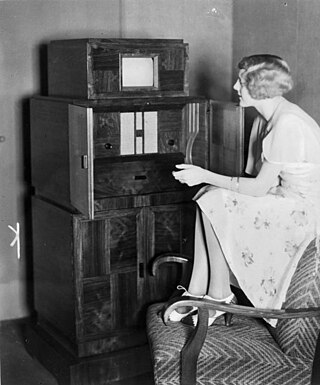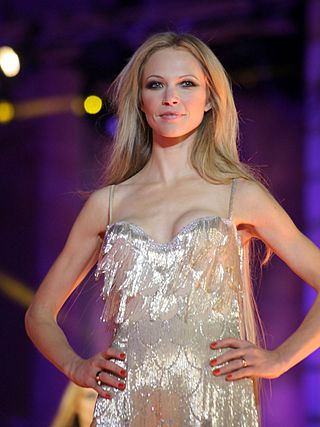Related Research Articles

ZDF, short for Zweites Deutsches Fernsehen, is a German public-service television broadcaster based in Mainz, Rhineland-Palatinate. Launched on 1 April 1963, it is run as an independent nonprofit institution, and was founded by all federal states of Germany. ZDF is financed by television licence fees and advertising revenues.

ARD is a joint organisation of Germany's regional public-service broadcasters. It was founded in 1950 in West Germany to represent the common interests of the new, decentralised, post-war broadcasting services – in particular the introduction of a joint television network.

3sat is a free-to-air German-language public service television channel. It is a generalist channel with a cultural focus and is jointly operated by public broadcasters from Germany, Austria (ORF) and Switzerland. The coordinating broadcaster is ZDF, at whose Mainz facility the broadcasting centre with studios for in-house productions is located.

Rundfunk Berlin-Brandenburg, commonly shortened to RBB, is an institution under public law for the German states of Berlin and Brandenburg, based in Berlin and Potsdam. RBB was established on 1 May 2003 through the merger of Sender Freies Berlin (SFB) and Ostdeutscher Rundfunk Brandenburg (ORB), based in Potsdam, and is a member of the Association of PSBs in the Federal Republic of Germany (ARD).

Felicitas Woll is a German actress. She is perhaps best known for her roles in the television series Berlin, Berlin (2002–2005) and the television film Dresden (2006).
Bayerischer Fernsehpreis is an award presented by the government of Bavaria, Germany since 1989. The prize symbol is the "Blue Panther", a figure from the Nymphenburg Porcelain Manufactory. The prize money is €10,000.

The first regular electronic television service in Germany began in Berlin on March 22, 1935, as Deutscher Fernseh Rundfunk. Broadcasting from the Fernsehsender Paul Nipkow, it used a 180-line system, and was on air for 90 minutes, three times a week. Very few receivers were ever privately owned, and viewers went instead to Fernsehstuben. During the 1936 Summer Olympics, broadcasts, up to eight hours a day, took place in Berlin and Hamburg. The Nazis intended to use television as a medium for their propaganda once the number of television sets was increased, but television was able initially to reach only a small number of viewers, in contrast to radio. Despite many technical improvements to camera technology, allowing for higher resolution imaging, by 1939, and the start of World War II, plans for an expansion of television programming were soon changed in favor of radio. The production of the TV receiver E1, that had just started was cancelled because of the war. Nevertheless, the Berlin station, along with one in occupied Paris, remained on the air for most of World War II. A special magazine called Fernsehen und Tonfilm was published.

Maybrit Illner is a German journalist and television presenter.

Carmen Thomas is a German journalist, radio and television presenter, author and lecturer. On television, she was the first woman to present the ZDF's das aktuelle Sportstudio. She worked for public radio, running Hallo Ü-Wagen, a weekly travelling talk radio show for two decades. In 1990 Forbes named her one of the 100 most influential women in Germany.
Das aktuelle Sportstudio is a weekly sports TV show on German channel ZDF, broadcast late on Saturday evenings. The program is repeated later on 3sat. It was first broadcast on 24 August 1963. From 1999 to 2005, the program was called ZDF Sportstudio.

Birte Glang is a German actress, brand ambassador, and fashion model. She started her career as a series regular on the award winning TV soap opera Unter uns. In 2012, she starred in the German James Bond parody Agent Ranjid rettet die Welt. In 2014, she was booked for a film with the comedian Nick Offerman.

Valerie Niehaus is a German actress.
This is a list of German television related events from 2002.

Annett Fleischer is a German presenter and actress.
Viktor Worms is a German radio and television host and producer.
"(You Made the) Summer Go Away", or simply shortened "Summer Go Away", is a song recorded by the American actor and singer David Hasselhoff featuring German recording artist Blümchen. The song was released on July 13, 2019, through Membran and Politur. The Swedish Grammy-nominated songwriter Jörgen Elofsson wrote the song. Hasselhoff chose Blümchen to sing the duet, when meeting backstage at one of the 90s Festivals. The track is a midtempo reggae fusion and pop song, which describes a couple leaving one another, having bad feelings afterwards.

Bettina Schausten is a German journalist.

Valeska Homburg is a German journalist and television presenter.

Aline Abboud is a German journalist and television presenter. Having studied Arab studies at Leipzig University, she worked for the German public broadcaster ZDF as an editor and reporter with a focus on foreign affairs. Since September 2021, Abboud presents Tagesthemen, a daily news magazine broadcast by ARD. She is the first woman born in the German Democratic Republic to hold this position.

Golineh Atai is a German journalist and TV-correspondent. She is known in particular as a Russia expert.